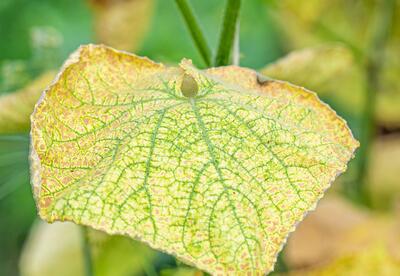
Figure 1. Symptoms of Cucurbit yellow stunting disorder virus infection. Image provided courtesy of Mike Matheron, University of Arizona, Bugwood.org.
Agdia, Inc. is happy to announce the commercial launch of a field-deployable rapid molecular test kit on their AmplifyRP® XRT platform for onsite detection of Cucurbit yellow stunting disorder virus (CYSDV).
For growers who prefer to send plant samples to Agdia for analysis, this product will also be used by their Testing Services diagnostic laboratory, where customers receive expert guidance on crop screening and rapid turnaround time of test results.
Cucurbit yellow stunting disorder virus is a plant pathogenic virus from the Crinivirus genus that primarily causes disease in cucurbits, but can also infect several other crops. First discovered in the Middle East in the late 1980s / early 1990s, it has since been detected across the Mediterranean region, Asia, several African countries, the United States and Mexico. It is transmitted primarily by several species of whiteflies (Bemisia tabaci / Bemisia argentifolii). While not spread mechanically nor through seed transmission, long-range spread of the virus can occur through transport of infected material (for example, seedling transplants).
Cucurbit crops (melon, watermelon, squash, pumpkin, etc.) can be severely impacted by CYSDV. Infection often results in significant losses in fruit size, yield and quality (lower sugar content in fruit).
Symptoms often include chlorotic spots, mottling, interveinal chlorosis or yellowing (Figure 1). Such symptoms are nearly indistinguishable from those caused by other viruses such as Cucurbit chlorotic yellows virus (CCYV, Crinivirus), Cucurbit aphid-borne yellows virus (CABYV, Polerovirus) and certain nutrient deficiencies. Thus, diagnostic confirmation of the causal agent is a critical component of identifying disease management strategies to combat the virus and vector.
Other hosts reported to be infected with CYSDV include:
- Common bean (Phaseolus vulgaris)
- Shepherd’s purse (Capsella bursa-pastoris)
- Lettuce (Lactuca sativa)
- Alfalfa (Medicago sativa)
- Wright’s ground cherry (Physalis wrightii)
- Several other weed species
Extensive validation studies were conducted to demonstrate fitness for purpose of the new molecular assay developed by Agdia for the detection of CYSDV:
- Diagnostic specificity is 100% (108 out of 108 true negatives detected). No cross reactivity was observed with other pathogens tested during product validation.
- The new assay successfully detected 143 out of 147 positive samples, resulting in a diagnostic sensitivity of 97.3%.
- All isolates tested (including those from the United States, the Middle East, Europe & Africa) were successfully detected.
To view the full validation report, see the "Technical Information" tab on the product page.

Figure 2. Pair the new test with Agdia's AmpliFire® Pro portable isothermal fluorometer (coming soon!)
About AmplifyRP®
Agdia’s new AmplifyRP® XRT assay for the detection of CYSDV is based on recombinase polymerase amplification (RPA). This technology promotes the rapid amplification and detection of nucleic acid targets, DNA or RNA, while maintaining a single operating temperature of 39–42 °C.
AmplifyRP® products achieve sensitivity and specificity comparable to PCR, while having clear advantages over the lab-based technology. AmplifyRP® products do not require a nucleic acid purification step; crude sample extracts are prepared using a simple extraction buffer and tested directly. When paired with Agdia’s AmpliFire® Pro isothermal fluorometer (Figure 2, coming soon!), the AmplifyRP® system is a user-friendly tool that can be implemented in the field or the lab by personnel with limited experience in molecular diagnostics. Total assay time is less than 30 minutes when used with the AmpliFire® as a real-time assay.
About Agdia
A leading provider of diagnostic solutions for agriculture, Agdia, Inc. has been serving plant breeders, propagators, growers, universities, and private testing laboratories since 1981. The company offers a comprehensive portfolio of validated, easy-to-use diagnostics for identifying plant pathogens, hormones, and transgenic traits. In addition, Agdia operates an ISO accredited, in-house, testing services laboratory. Agdia’s quality management system is ISO 9001:2015 certified and their Testing Services Laboratory is ISO/IEC 17025:2017 accredited by ANAB. Visit the company’s website at www.agdia.com, e-mail info@agdia.com, phone 1-574-264-2615 (toll-free 800-622-4342) or fax 1-574-264-2153.
AmplifyRP® and AmpliFire® are registered trademarks of Agdia, Inc.





